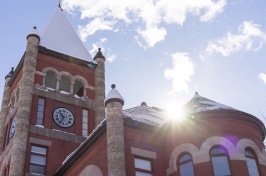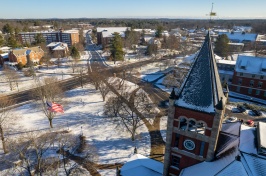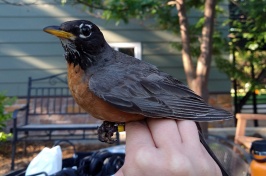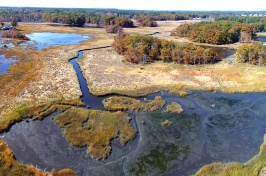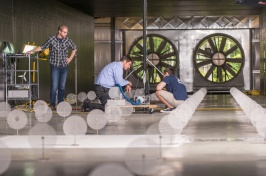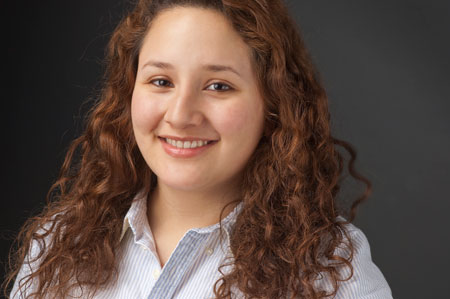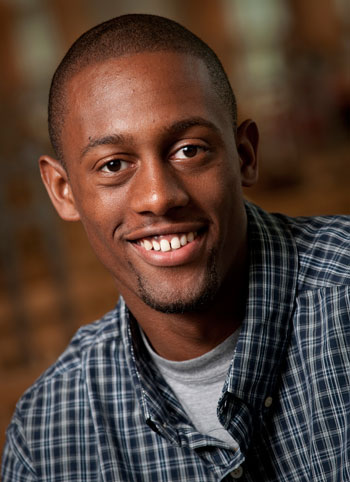Under-represented Students Find Confidence (and Funding) to Pursue Advanced Degrees
|
|
Cathleen Turner ’12 is headed to the University of Rhode Island this fall to pursue a master’s degree in chemical oceanography.
That wasn’t always the plan. “I wouldn’t have considered going to graduate school without McNair,” says Turner, an environmental science major who participated in the McNair Scholars Program at UNH. Part of the national Ronald E. McNair Post-Baccalaureate Achievement Program (named for the black astronaut and physicist who died in the 1986 Challenger disaster), the program aims to encourage students from under-represented groups to pursue doctoral studies and enter academia.
Since it began operating at UNH in 1991, the program has played a key role in shaping the post-college plans of some 260 students — minorities and, especially, those with high financial need whose parents lack bachelor’s degrees.
For Turner, a first-generation college student and one of 11 McNair Scholars who graduated last Saturday, the program’s research focus was especially important in helping her decide to attend graduate school. After her sophomore year, she participated in an intensive two-month summer session on campus (for which McNair students receive a $2,800 stipend plus room and board) that allowed her to work on a self-designed research project with a faculty mentor. Under the guidance of Matthew Davis, associate professor of hydrogeology, she examined how land-use changes over many years had affected water quality in the Lamprey River Watershed.
She’d become interested in the issue after visiting relatives in Ecuador’s gold-mining region, where she heard about water-related conflicts between miners and locals, saw trash dumped into a river, and experienced periods without running water. A course taught by Davis (called Water — How Much Is Enough?), which she took her first semester at UNH, also made her more aware of water issues. “I wanted to do something about the problem in Ecuador — or at least do something related to that,” she says.
During her junior year, she learned through McNair of a program called SURGE (Summer Undergraduate Research in Geoscience and Engineering) at Stanford University. Last summer, she traveled to California, where she studied the role of microorganisms in producing nitrate, an important step in the nitrogen cycle in Monterey Bay.
Turner isn’t yet sure whether she’ll get her Ph.D. However, she says the McNair program introduced her to the possibility of working as a scientist at a college rather than at a company and exposed her to the world of academia. “I’m more confident about entering this different world because of McNair.”
Of the nearly 260 McNair Scholars in the program’s first two decades at UNH, more than 100 have earned master’s degrees and 38 have received doctoral or professional degrees. This academic year, a $270,000 federal grant (along with a 32 percent match from the university) financed 34 UNH McNair Scholars and served an additional 34 first-year participants through advising, networking and academic seminars. Because of government budget cuts, however, fewer universities will receive funding for McNair next year — and that means the program’s future at UNH isn’t assured.
|
|
Living the McNair Dream
For now, though, the program is celebrating its twenty years on campus by sending a new crop of graduates to do advanced study. When Matthew Richards ’12 applied to the McNair program as a freshman, he wasn’t convinced that graduate school would be in his future. Among his reasons: he wasn’t sure where he’d get the money for tuition, and he was afraid he wouldn’t be able to handle it academically.
Three years later, Richards, who received a B.S. in kinesiology with an emphasis in sport studies, plans to earn a master’s degree in exercise science with emphasis in sport performance at Ball State University in Muncie, Ind. He says the McNair program changed his view of graduate school, showing him that it could be tailored to his interests. He also received a McNair Fellowship that, along with a graduate assistantship, will provide full financial support while he pursues his degree. Perhaps most important, his success in the McNair program helped him realize that he could do well in graduate school.
“I tell my friends that I’m living the McNair dream — going through the McNair program, completing it, and getting full funding,” Richards says.
Richards was born and raised in Worcester, Mass., after his parents emigrated from Jamaica with his older sister. “My parents moved to the States for a better life and more opportunities,” he says.
His father has no post-secondary education; his mother took a few courses at a community college but did not earn a degree.
For his research project, Richards, a four-year intramural basketball player at UNH, naturally turned to his longtime passion, sports. Working with Associate Professor of Kinesiology Karen Collins, Richards examined whether high school coaches who took part in a coaching seminar reported improved confidence in their abilities. “Conducting research on high school coaches was dear to me because, like many students I talk to, I did not have the greatest high school coach experience.”
Ultimately, the study revealed no significant change after the seminar, most likely because of a small sample size. However, the experience taught Richards how to read and critique scholarly articles, how to write for an academic audience, and how to present his work to others, as he did in April at a McNair symposium in San Juan, Puerto Rico.
And this spring, he got published for the first time when his article about the coaching study appeared in Inquiry, UNH’s online undergraduate research journal. “I never dreamed for one second that was something I could do,” he says.
Originally published by:
UNH Today
Written by Sonia Scherr, ’13MFA. Photos by Perry Smith, UNH Photographic Services.











